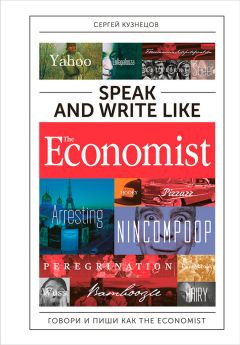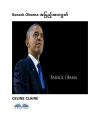
Автор книги: Сергей Кузнецов
Жанр: Иностранные языки, Наука и Образование
Возрастные ограничения: +12
сообщить о неприемлемом содержимом
Текущая страница: 3 (всего у книги 35 страниц) [доступный отрывок для чтения: 12 страниц]
The wealth distribution in the world is equivalent to a world of ten people, in which one has $1,000 and the other nine has $1 each.
John Maynard Keynes still best describes the challenge facing the discipline today: «Economics is the science of thinking in terms of models joined to the art of choosing models which are relevant to the contemporary world.»
Why didn't Sony invent the iPod?
The Busara Centre for Behavioural Economics in Nairobi, Kenya, runs experiments with participants from slums and rural areas. Its researchers looked at the results of a lottery-like scheme in rural Kenya, in which a random sample of 503 households spread over 120 villages was chosen to receive cash transfers of up to $1,525. The average transfer, $357, was almost enough to double the wealth of a typical villager. The researchers measured the well-being of villagers before and after the transfer, using a range of different methods: questionnaires about people's life satisfaction, screening for clinical depression and saliva tests for cortisol, a hormone associated with stress. There is an asymmetry in the way people compare themselves with others. We tend to look exclusively at those better off than us, rather than contemplate our position within the full range of outcomes. When the lot of others improves, we react negatively, but when our own lot improves, we shift our reference group to those who are still better off. In other words, we are never satisfied, since we quickly become accustomed to our own achievements. Perhaps that is what spurs people to earn more, and economies to grow.
The latest rally has been led by a small namber of stocks, sometimes dubbed the FAANGs (Facebook, Amason, Apple, Netflix and Google's parent, Alphabet) and sometimes FAAMG (replacing Netflix with Microsoft).
Should guests really expect authentic affection from staff whose weekly wage is less than their minibar bill?
Sometimes when you make a step forward you step in shit.
It is amazing how little $25m buys you these days.
Winston Churchill famously said America would always do the right thing after exhausting the alternatives.
If bullshit was currency, he would be a billionaire.
Slave ships could be smelled from miles away.
My watch costs more than your car… that's who I am.
Putting your man in charge is one thing, putting money on the table quite another.
Consultants steal your watch and then tell you the time.
Ford famously said that car-buyers could have any colour they liked, as long as it was black.
Rise early, work hard, strike oil.
They say that money can't buy happiness, but I would like to find out for myself if that's true.
Adam Smith spotted that economics has problems valuing nature. «Nothing is more useful than water: but it will purchase scarce anything; scarce anything can be had in exchange for it. A diamond, on the contrary, has scarce any value in use; but a very great quantity of other goods may frequently be had in exchange for it,» he wrote.
«For a moderate fee,» jokes Deirdre McCloskey, an economic historian, «an economist will tell you with all the confidence of a witch doctor that interest rates will rise 56 basis points next month or that dropping agricultural subsidies will increase Swiss national income by 14.8 %.»
Haier and higher!
Britain had a window tax in the late 17th century, well before it introduced an income tax.
Pay the gas bill first, in other words, and then think of the world cruise.
The economic forces driving high-flying legal eagles into the bargain bin are no mystery.
The typical chief executive is more than six feet tall, has a deep voice, a good posture, a touch of grey in his thick, lustrous hair and, for his age, a fit body.
Running US Steel at the turn of the 20th century, Charles Schwab was perhaps the first person in America to earn a salary of $1m a year. What made him so successful? Was he a genius? No. Did he know more about steel than other people? Certainly not. So how did he get ahead? Schwab knew how «to make people like him».
At present the tallest is the Burj Khalifa in Dubai, which was completed in 2010 and, at 828 metres, shot past the previous record-holder, the 508-metre Taipei 101 tower. The Mecca Royal Clock Tower in Saudi Arabia, completed in 2012, is now, at 601 metres, the second-tallest. The Freedom Tower in lower Manhattan, built near the site of the World Trade Centre's twin towers (417 metres and 415 metres) that were destroyed by al-Qaeda in 2001, had its spire added in May to reach 541 metres. But work has now started on the Kingdom Tower in Jeddah, Saudi Arabia. Its exact proposed height is still a secret, but it will be at least a kilometre.
Scratch the surface of the planet and the chances that hydrocarbons will spew forth appear to grow by the day. This week America's Energy Information Administration (EIA) released new estimates of the amount of gas in the world's shale beds. It reckons that there are 7,299 trillion cubic feet, 10 % more than its 2011 estimate. The EIA's estimates for shale oil, not included in the 2011 numbers, are a staggering 345 billion barrels, adding a tenth to the world's total oil resources.
You can happily go through a day consuming nothing but the products of family concerns: reading the New York Times (or the Daily Mail), driving a BMW (or a Ford or a Fiat), making calls on your Samsung Galaxy, munching on Mars Bars and watching Fox on your Comcast cable.
He was a man of splendid abilities, but utterly corrupt. Like rotten mackerel by moonlight, he shines and stinks.
Koch Industries has also demonstrated a striking ability to reform itself. Prodded by the spate of legal suits in the late 1990s, the firm introduced a big safety programme. Charles's corporate mantra was «10,000 % compliance with all laws and regulations», by which he meant 100 % compliance from 100 % of employees.
Gold miners were supposed to be «believers» in gold rather than efficient managers out to maximise profits.
The best way to find Albany on a map is to look for the intersection of greed and ambition.
Simon Kuznets, a Nobel laureate, is supposed to have remarked: «There are four kinds of countries in the world: developed countries, undeveloped countries, Japan and Argentina.»
The supply side sets the scene; the demand side provides the drama.
Facebook, Google and Groupon were all founded by people in their 20s or teens. Mark Zuckerberg, aged 27, will soon be able to count his years on earth in billions of dollars.
Relying on the import of money, workers and brains, America is a Ponzi scheme that works.
Managers who rely too much on their strengths may become hammers that see every problem as a nail.
Diamonds, famously, are a girl's best friend, graphite makes good pencil lead.
Walmart, the world's biggest retailer, has 1,500 employees in Silicon Valley trying to out-Amazon Amazon in areas such as logistics and making the most of social media.
Of the 7 billion people alive on the planet, 1.1 billion subsist below the internationally accepted extreme-poverty line of $1.25 a day. America's poverty line is $63 a day for a family of four.
When, as happened during the Napoleonic wars, a slaver's ship was captured by French privateers, the blacks aboard were often treated more carefully than the white seamen. The blacks were prized goods and their worth soared as commodity-based booms in the New World overwhelmed the sentiments of liberty, equality and fraternity. Once enslaved, the Africans were valuable as «investments (purchased and then rented out as labourers), credit (used to secure loans), property, commodities, and capital, making them an odd mix of abstract and concrete values.»
Hundreds of jobs depend on Hollywood productions: blockbusters may require the help of as many as 1,000 firms. Producers need massages, assistants require stationery and starlets want scented candles and fresh roses; let alone what props managers, set-builders and costume departments will holler for.
Aluminium was once more costly than gold. Napoleon III, emperor of France, reserved cutlery made from it for his most favoured guests, and the Washington monument, in America's capital, was capped with it not because the builders were cheapskates but because they wanted to show.
The farthing was once made of silver, was steadily switched to cheaper copper, tin and bronze.
I am young and unemployed and face a lifetime on the dole. Why? This morning I collected my jobseekers allowance from my bank, where I have it paid directly into my account. I did not see a cashier, but withdrew money from a cash point. Then I went to the supermarket and bought French apples, German sausage and Danish bacon. I scanned the items at a self-service till, no need for a check-out assistant. I went home, switched on my Chinese computer and applied for jobs online. I do not send letters through the post; e-mail is more convenient. I then shopped online, I rarely use local shops. Who can I blame for the lack of jobs?
The original sin begins (depending on the chapter) in 1914, when the world suspended the gold standard at the start of the first world war; in 1933, when Franklin Roosevelt devalued the dollar against gold; in 1971, when Richard Nixon ended the dollar's convertibility to gold under the Bretton Woods system; or in 1987, when Alan Greenspan cut interest rates after the stockmarket crash.
What is the single most important price in the world? Popular answers are the price of oil, American interest rates or the dollar. Yet Chinese wages are, arguably, more important. China has by far the world's biggest labour force, of around 800m – almost twice that of America, the European Union and Japan combined.
In 1820, as some historians reckon and Chinese commentators like to point out, China's GDP was one-third of the world total. Then the reversals of the century of humiliation brought it low. By the 1960s, China's GDP had dropped to just 4 % of the world total. Now it has recovered to about one-sixth of the world's GDP – and at least 90 % of America's – in purchasing-power parity terms, according to the Conference Board, a business research organisation. Nationalists eagerly await the day when China's economy becomes once more the biggest in the world by any measure.
The super-duper rich are surprisingly unimaginative when it comes to dreaming up new ways to outdo each other. It includes such essentials as a mini-submarine, a hair salon and two helipads. Owning a yacht with only one helipad would be embarrassing – a bit like owning a football club that is only fourth in England's Premier League.
Over 1.2 billion people have to defecate in the open. Surprisingly, some of those who have to defecate in the open do not mind. Some rural men, and even women, quite enjoy a social squat in the bushes. Slum-dwellers in Nairobi have to pick their way through streams of sewage and take care to avoid «flying toilets», plastic bags filled with excrement that are flung with desperate abandon into the night. Nearly two-fifths of the United States' 25,000 sewer systems illegally discharged raw sewage or other nasty stuff into rivers or lakes in 2007–09, and over 40 % of the country's waters are considered dangerously polluted. Contaminated water lays low almost 20m Americans a year.
Cyprus never misses an opportunity to miss an opportunity.
In Ghana the funereal send-off is as important as the life itself. But the costs, borne by extended families, can be punitive. Some 45 % live on less than $1 a day, 79 % on less than $2. Yet funerals tend to cost between $2,000 and $3,500. «Money measures the quality of the funeral and the family,» says Sjaak van der Geest, an anthropologist. The more cash spent, the higher the reputation of the deceased and the family. Mr Okai died in hospital, then spent almost three months in the morgue, at a cost of $521: the longer your body is in the fridge, the more prestigious. The Ga king, recently buried in Accra, was on ice for 18 months; the Dagbon king, in northern Ghana, for a record four years.
Nobody knows how many homeless there are in Paris.
US Treasury Secretary Geithner's life in the trenches has produced its own vocabulary. Serious decisions are «consequential», good ideas are «cool», better ideas are «compelling» and the best ideas are at «the optimal frontier». During a crisis «plan beats no plan», jury-rigged measures in the face of unavoidable disaster are «foam on the runway», and bad outcomes are «dark». Managing public perceptions is called «theatre». «Fuck» also holds a prominent place in the Geithner lexicon, usually as an adjective, not a verb, as in «I have no fucking idea.»
China's epic industrial boom will not be repeated; the days of making billions by shipping iron ore from Goa to Guangdong are over.
You have a decent job and work hard. You keep your nose clean, respect authority and have never joined a protest march. Suddenly you have the bad luck to face a cruel and seemingly impossible choice. Your superiors tell you to do something outrageous or unacceptable. Do you obey or, at grave personal cost, refuse?
China makes things you can drop on your foot. America merely designs, brands and peddles them.
As Fred Hirsch argued in his 1977 book, «The Social Limits to Growth», many good things in life are «positional». You can enjoy them only if others don't. Sometimes, a quick car, fine suit or attractive house is not enough. One must have the fastest car, finest suit or priciest house.
Consumers cannot compare what is legally produced in California with what is legally produced in Colorado – to say nothing of what is illegally sold in New York's Washington Square Park.
Ekhart, Indiana, is the RV capital of the world.
Until recently, Carrefour's supermarkets in France were run along Napoleonic lines. Strict orders emanated from its headquarters in Paris. Every store sold a similar range of products. If selling groceries were like marching an army over the Alps, this strategy would have worked brilliantly. But it isn't, and it didn't. At the big Carrefour in Monacoout went the racks of cheap luggage, of the sort chic locals would be embarrassed to see their servants carrying.
Mr Abe promised that Japan would enter trade negotiations to join the American-led Trans-Pacific Partnership (TPP) – though he offered no promise to eliminate tariffs of up to 777.7 % on rice.
Big pickups are seen in the car industry as a leading indicator: rising sales point to Americans starting to build kitchens, fix roofs and hire contractors.
Family history has large effects that persist for much greater spans of time. Fathers matter, but so do grandfathers and great-grandfathers. Indeed, it may take as long as 300–500 years for high– and low-status families to produce descendants with equal chances of being in various parts of the income spectrum.
Some 3m wrecks pepper the ocean floors, according to the UN (though few contain riches). Finding them involves lengthy research and lucky breaks. Recovery can take months of work by specialist crews. Of 52 annual reports filed by publicly listed shipwreck-recovery firms since 1996, only five show a net profit.
Acquisitions can also be a form of financial engineering. This was a favourite game of the conglomerates of the 1970s and 1980s. A company with highly rated shares would bid for a group with poorly rated equity. Say Acme has 100m shares, earnings of $10m (earnings per share of 10 cents) and a share price of $2 (a price-earnings ratio of 20). Grotco has the same earnings and number of shares but its share price is just $1 (a p/e of 10). If Acme makes an all-share bid valuing Grotco at $1.20, it will need to issue 60m new shares. The combined group will have $20m of earnings, 160m shares and earnings per share of 12.5 cents. With the help of nothing more than maths, Acme's earnings per share will have jumped by 25 %. Merger booms usually peak with the kind of deal that resembles a Las Vegas wedding after an alcohol-fuelled night: both parties regret it in the morning.
Chairman Mao, as ever, had said it best: imagine the ping-pong ball as the head of your capitalist opponent, and each shot a point for the motherland.
Overall, the number without homes in the US is staggering. The number of homeless veterans of the Vietnam war is greater than the number who died in it. On any given night in America more than 640,000 men, women and children are forced to seek shelter, live in their cars, or sleep on the streets. Last year nearly 1.6m people used an emergency shelter.
A Polish Jew in an Episcopal graveyard in a largely Dominican neighbourhood. What could be more New York?
Obama sold Chrysler to Italians who are going to build Jeeps in China.
The average Swiss watch costs $685. A Chinese one costs around $2 and tells the time just as well (see chart). So how on earth, a Martian might ask, can the Swiss watch industry survive? Yet it does. Few can match the precision of a Nivarox («Nicht variabel oxydfest» (G.) or «Non-Variable Non-Oxidizing») balance spring.
The euro needs French reform, German extravagance and Italian political maturity.
In happier days before the euro crisis, one government in Lisbon rebranded the Algarve as the Allgarve, hoping to appeal to English-speaking tourists. Now a Portuguese wit suggests rebranding the whole country as Poortugal.
The cult of the insider in Japan is rooted in its paddy fields, some scholars argue. To cultivate wet rice, villagers need to work together, sharing land, labour, water and gossip. Anyone not in the group is out of the loop. There is something of the rice paddy about Japan's capital markets, too.
«LVMH is like a mini Germany,» boasts an insider. Like that country's Mittelstand, it has built a reputation for craftsmanship and quality that people are happy to pay extra for. The difference is, the Mittelstand makes unsexy things such as machine tools and shaving brushes, whereas LVMH makes champagne, handbags and other objects of desire.
The 1912 games were the last one where gold medals were made entirely of gold. Now they consist mainly of silver with a thin coat of gold. Winners in London are advised not to bite too hard on their medals, as they will have a gold content of only about 1.5 %.
Kurt Vonnegut wrote that: «In every big transaction, there is a magic moment during which a man has surrendered a treasure, and during which the man who is due to receive it has not yet done so. An alert lawyer will make the moment his own, possessing the treasure for a magic microsecond, taking a little of it, passing it on.» Like so many novelists, he was talking bosh. No alert lawyer takes only «a little».
When asked why he robbed banks, Willie Sutton, a prolific bank robber (pictured, after he retired), is said to have replied: «Because that's where the money is.» Sutton reportedly pinched $2m during a lifetime of crime.
The phenomenon has been described as the Wimbledon effect: Britain provides the beautiful arena where foreign champions come and beat the hell out of British players. The annual Oxford-Cambridge Boat Race is much the same: a slugfest between predominantly non-British mercenaries.
The real money is where the pain is.
The human animal is a beast that must die. If he's got money, he buys and buys and buys everything he can, in the crazy hope one of those thing.
«Corruption is rampant at high levels, and at low levels,» said an FBI agent, before adding: «and all levels in between».
Foreign remittances continue to grow. In all, 250m migrant workers will send home $500 billion this year – up from $410 billion in 2012. At their destination savings often end up under the mattress – rather than channelled into microfinance schemes, for instance, as many development experts have long hoped. The marriage between remittances and microfinance has not happened yet.
«Republican gluttons of privilege» who had «stuck a pitchfork in the farmer's back».
He spent his entire career within the DeBeers stable.
It takes pride in sticking to its companies through thick and thin.
The distinction between being a successful tycoon and being an enemy of the people has been blurred.
Marriott likes to buy to the sound of cannons and sell to the sound of violins.
40 % of Missourians would oppose a new tax even if it was being used «to construct the landing pad for the second coming of Christ».
Once upon a time the overstressed executive bellowing orders into a telephone, cancelling meetings, staying late at the office and dying of a heart attack was a stereotype of modernity. Cardiac arrest – and, indeed, early death from any cause – is the prerogative of underlings. The best medicine, then, is promotion. Prosper, and live long.
Narcissism index indicators of CEO: prominence of the boss's photo in the annual report, company press releases. Length of his Who is Who entry, frequency of his use of the first singular interviews, ratios of cash compensation to second-highest paid exec.
Of course, successfully picking the leader of a big public company has always been tricky, because the job requires at least two quite different skills. Like the fox, a chief executive must know lots of little things, must manage successfully the key day-to-day aspects of the business. But like the hedgehog, he must also know one big thing: every three or four years, he will have to take a substantial strategic decision, which may mortally wound the business, if he gets it wrong. Plenty of giants, such as Cable & Wireless and AT&T, have had leaders who passed the fox test but failed the hedgehog one.
The Chinese dragon's coils encircling the world are getting tighter by the day.
In business, as in photography, it pays to stay focused.
The number of people in the United States living in poverty increased last year to 39.8 million – the highest percentage of the population in 11 years, the Census Bureau said Thursday. The number equals 13.2 percent of the country's population and is 2.5 million more than were living in poverty in 2007, which is defined by the agency as a person making less than $10,991 or a family of four making less than $22,025.
This new elite is not just a breed apart. It lives apart, in bubbles such as Manhattan south of 96th Street (where the proportion of adults with college degrees rose from 16 % in 1960 to 60 % in 2000) and a small number of «SuperZips», neighbourhoods where wealth and educational attainment are highly concentrated. These neighbourhoods are whiter and more Asian than the rest of America. They have less crime and more stable families. They are not, pace Mr Gingrich, necessarily «liberal»: plenty of SuperZips voted Republican in 2004. But they are indeed out of touch.
The have-a-nice-day stuff of Walmart in Germany went down like a lead Zeppelin with employees and shoppers alike.
Hopkins was the most flamboyant advertising genius of the early 20th century – the man who convinced millions of women to buy Palmolive soap on the basis that Cleopatra had washed with it, and got the world talking about puffed wheat with the claim that it was «shot from guns» until the grains puffed to eight times their normal size.
Every company starts out as a shell. Just £ 349 ($560) buys you a company in the Seychelles, with no local taxation, no public disclosure of directors or shareholders and no requirement to file accounts. Prices rise to £ 5,000 for more sophisticated corporate structures in places like Switzerland and Luxembourg. Two firms handle two-thirds of all Delaware companies: CT Corporation (part of Wolters Kluwer of the Netherlands) and CSC.
There is no limit to human ingenuity in finding new ways to go bust.
Before the crisis many central bankers believed that all they needed was a «hammer» (interest rates) to strike a «monetary nail» (consumer-price inflation). But not every problem is a nail. Policymakers also need a full set of «macroprudential» tools, from wrenches to duct tape E.
Mr Murray starts by lamenting the isolation of a new upper class, which he defines as the most successful 5 % of adults (plus their spouses) working in managerial positions, the professions or the senior media. These people are not only rich but also exceptionally clever, because America has become expert at sending its brightest to the same elite universities, where they intermarry and confer on their offspring not just wealth but also a cognitive advantage that gives this class terrific staying power.
The best time to invest is when there is blood in the streets.
In the 19th century Alexis de Tocqueville marvelled that in America the opulent did not stand aloof from the people. A great cultural gap separates the elite from other Americans. They seldom watch «Oprah» or «Judge Judy» all the way through. In fact they do not watch much television at all. They eat in restaurants, but not often at Applebee's, Denny's or Waffle House, chains that cater to the common taste. They may take The Economist, with the New York Times, Wall Street Journal, and perhaps the New Yorker or Rolling Stone. They drink wine and boutique beers (and can discuss them expertly) but only in moderation, and they hardly ever smoke cigarettes.
Mr Icahn had expounded his theory of the moronisation of American management. The typical chief executive, he said, to chuckles, is «the guy you knew in college, the fraternity president – not too bright, back-slapping, but a survivor, politically astute, a nice guy». To be a chief executive, you need to know how not to tread on anyone's toes on the way up. You eventually become the number two, who «has got to be a little worse than the number one to survive». When the number two becomes chief executive, he promotes someone a little worse than him as his second-in-command. «It is the survival of the unfittest,» concluded Mr Icahn. «Eventually we are all going to be run by morons.»
Most students of taxation know the advice that Jean-Baptiste Colbert, treasurer to Louis XIV, offered the beleaguered taxman: pluck the goose so as to get the most feathers with the least hissing. But suppose the goose is housed on one farm, eats the birdseed scattered in a second, and lays its eggs in a third. Which farmer gets the plumage?
History offers perhaps only one true example of a reserve-currency shift, from the British pound to the dollar. The pound was king during the era of the gold standard. But in the years after 1914, Britain switched from net creditor to net debtor, and by the 1920s the dollar was the only currency convertible to gold (although the pound returned to gold in 1925). Two costly wars and two episodes of currency devaluation in Britain later, the dollar was unchallenged as the world's chief reserve currency.
Americans used to believe that their constitution protected private property. The Fifth Amendment allows the state to seize it only for «public use», and so long as «just compensation» is paid. «Public use» has traditionally been taken to mean something like a public highway. Roads would obviously be much harder to build if a single homeowner could hold out forever or for excessive compensation. The government's powers of «eminent domain» have also been used to clean up «blighted» slums. «Urban renewal», he noted, has sometimes been nicknamed «negro removal».
The «triangular trade» as it was known, whereby slave-ships left European ports for west Africa with rum, guns, textiles and other goods to exchange for slaves, and then transported them across the Atlantic to sell to plantation-owners, and then returned with sugar and coffee, also fuelled the first great wave of economic globalisation. Slavers in France would send their shirts to be washed in the streams of the Caribbean isle of St Domingue, now Haiti; the water there was said to whiten the linen better than any European stream.
The price of used furniture is nothing but a viewpoint, and if you wouldn't understand the viewpoint is impossible to understand the price. With used furniture you can't be emotional 49.
There is almost no house property in London that is not overburdened with a number of middlemen.
Although Britons are cross about high pay, few seek capitalism's overthrow: they dislike corporate fat cats for being fat, not for being cats.
Some firms are employing a «China + 1» strategy, opening just one factory in another country to test the waters and provide a back-up. if China's currency and shipping costs were to rise by 5 % annually and wages were to go up by 30 % a year, by 2015 it would be just as cheap to make things in North America as to make them in China and ship them there.
Mr Rao offered two deals on loose coffee beans: 33 % extra free or 33 % off the price. The discount is by far the better proposition, but the supposedly clever students viewed them as equivalent. Even well-educated shoppers are easily foxed.
If not in coin you must pay in humiliation of spirit for every benefit received at the hands of philanthropy.
When Deng Xiaoping, China's paramount leader, died in 1997 his only post was chairman of the China Bridge Association.
Shopping with coupons and jars of loose change. Watering down milk to make it go further. Using washing up liquid instead of shampoo. Inventing excuses for skipping lunch. Having to walk everywhere. Sharing beds and baths. Mending clothes that are themselves second-hand. Reviving old newspapers as makeshift lampshades. Always being tired – poverty in austerity.
The first is that entrepreneurs routinely see opportunities where everyone else sees problems. A surprising number of great companies were born out of fury and frustration.
When Wal-Mart tried to impose alien rules on its German staff – such as compulsory smiling and a ban on affairs with co-workers – it touched off a guerilla war that ended only when the supermarket chain announced it was pulling out of Germany in 2006.
When things went wrong for Middle Eastern tribes a couple of millennia ago, the accepted remedy was to send a sacrificial goat out into the wilderness to placate the gods. The practice continues today, but the voters have replaced the gods, and highly paid businesspeople the goats.
Правообладателям!
Данное произведение размещено по согласованию с ООО "ЛитРес" (20% исходного текста). Если размещение книги нарушает чьи-либо права, то сообщите об этом.Читателям!
Оплатили, но не знаете что делать дальше?








































